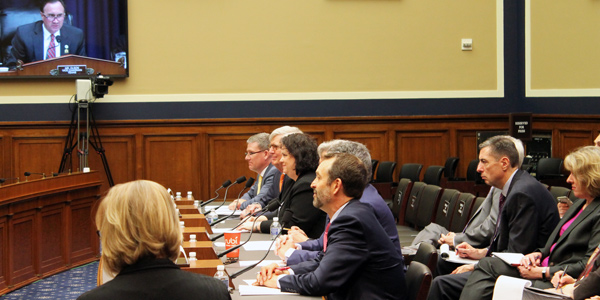By Michael Brooks
WASHINGTON — A panel of electricity industry leaders — including Public Service Enterprise Group CEO Ralph Izzo — came to the House Energy Subcommittee on Thursday prepared to talk about the importance of transmission infrastructure, but the visit was mostly in vain.
Votes on the House floor kept the hearing to about 90 minutes, most of it taken up by the prewritten opening statements by subcommittee leaders and the panelists. Subcommittee members barely asked any questions, and none were directed to either Izzo or Jennifer Curran, MISO vice president of system planning.
In the little time allotted to them, the panelists made clear that FERC Order 1000, which opened transmission development to competition in 2011, was not working as intended, with very few projects being approved.
But they differed in their overall assessment of the order. Izzo called for Congress to outright abolish the rule, while former FERC Commissioner Tony Clark repeated his past assertion that the order was “well-intentioned” but clearly needs revisiting by the commission.
The order replaced RTOs’ “collaborative, bottoms-up approach to transmission planning with a complex bureaucracy, where the name of the game is completing a compliance checklist that may not actually result in transmission development,” Clark said. He pointed to MISO’s multi-value projects as an example of pre-Order 1000 developments that were impactful.
Rob Gramlich, president of energy consultancy Grid Strategies, submitted detailed written testimony highlighting the benefits of the grid in lowering consumers’ costs and allowing access to resources in other regions. Among his recommendations was that the Energy Department use the never-applied Section 1221 of the 2005 Energy Policy Act, which allows the secretary of energy to designate transmission corridors in the national interest and for FERC to site and permit projects in those corridors.
“I recommend that for specific extra-high-voltage (e.g., 500 kV and up), long-distance lines that provide broad multistate reliability benefits and long-term consumer benefits, where state approval has been withheld after thorough consultation, DOE and FERC should be encouraged to be willing to use the current authority,” Gramlich wrote.
In the little time she spoke, Curran only gave general information about her RTO, lauding its transmission planning processes and reliability record. Also in attendance were Edward Krapels, CEO of Anbaric Development Partners, and John Twitty, executive director of the Transmission Access Policy Study Group.







